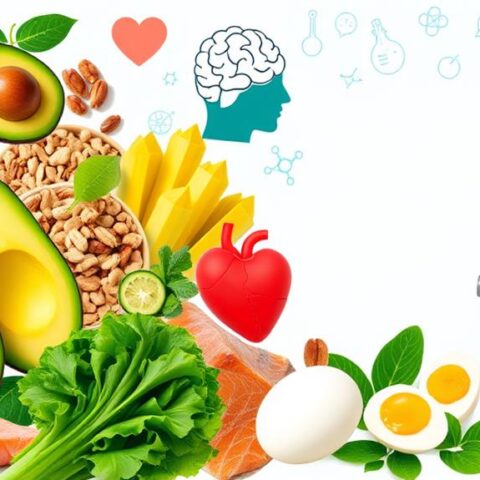
On a ketogenic diet, consuming 3 to 7 eggs per day is typically recommended due to their low carbohydrate content and high nutritional value. Each egg provides essential proteins, healthy fats, and crucial nutrients, contributing to satiety and overall health. Eggs are also rich in choline and omega-3 fatty acids, supporting brain and heart health. However, consideration of cholesterol intake is prudent, particularly for individuals with cholesterol concerns. Consulting with a nutritionist can help tailor egg consumption to individual health needs. For a deeper understanding, explore further information on ideal egg intake and benefits on the ketogenic diet.
Key Takeaways
- Consuming 6 to 7 eggs daily is typical for those on a keto diet.
- Starting with 3 eggs per day is a practical approach for beginners.
- Eggs are low in carbs and high in protein, aiding ketosis.
- Moderation is advised due to the cholesterol content in egg yolks.
- Consulting a nutritionist can provide personalized recommendations for egg intake.
Eggs and Keto Compatibility
Eggs are an exemplary food choice for individuals adhering to a ketogenic diet due to their remarkable nutritional profile that aligns perfectly with the diet's macronutrient requirements. With less than 1 gram of carbohydrates per egg, they are an ideal low-carb option. Their composition of approximately 6 grams of protein and 5 grams of healthy fats per egg fits seamlessly into the high-fat, low-carb framework of the keto diet, supporting both energy levels and satiety.
For added health benefits, egg yolks are high in antioxidants, which may help reduce the risk of certain chronic diseases. Additionally, eggs are nutrient-dense, containing B12, selenium, and vitamin A, which supports overall health.
Egg varieties such as free-range, organic, and pasture-raised can cater to different dietary preferences and ethical considerations without compromising nutritional benefits. Diverse cooking methods, including boiling, scrambling, poaching, and frying, offer versatility to prevent dietary monotony and enhance meal satisfaction. Each method maintains the eggs' essential nutrients while providing options to suit individual tastes and meal plans.
The recommended daily intake ranges from 6 to 7 eggs, although individuals may adjust this based on their specific dietary goals and nutritional needs. The nutrient-dense egg yolks contribute essential vitamins and minerals, reinforcing overall health.
Consequently, eggs not only facilitate adherence to keto guidelines but also promote a balanced, nutritious diet.
Nutritional Profile of Eggs
Due to their thorough nutritional profile, large eggs emerge as a highly suitable food item for those on a ketogenic diet. Each egg contains approximately 70-80 calories, 6 grams of protein, 5 grams of fat, and less than 1 gram of carbohydrates, rendering them highly compatible with keto dietary requirements.
In addition to these macronutrients, eggs are abundant in essential vitamins and minerals, including vitamins A, B12, D, E, K, as well as calcium and zinc, which contribute to overall nutritional adequacy. Eggs are also a good source of high-quality fats like monounsaturated fats, which help in improving cholesterol levels.
The nutrient-dense yolk holds most of these vitamins and healthy fats and provides about 186 mg of cholesterol. This cholesterol content positively influences High-Density Lipoprotein (HDL) cholesterol levels, which are beneficial for heart health, with minimal impact on Low-Density Lipoprotein (LDL) levels for most individuals.
The versatility of eggs also allows for a variety of egg preparation methods, from boiling and scrambling to poaching and baking, making them a staple in keto meal plans.
Proper egg sourcing is essential, as eggs from pasture-raised or organic sources generally offer higher nutritional value. Overall, eggs are not only nutritionally rich but also versatile and highly adaptable to various keto-friendly recipes.
Protein and Fats in Eggs
A single large egg offers approximately 6 grams of protein and around 5 grams of healthy fats, making it an invaluable component of a ketogenic diet. The high-quality egg protein contains all essential amino acids, vital for muscle repair and overall health. This makes eggs an excellent protein source, especially important for those adhering to a low-carb, high-fat dietary plan.
The healthy fats found in eggs, particularly within the yolk, include monounsaturated and polyunsaturated fats. These fats are not only beneficial for meeting the high-fat requirements of the keto diet but also contribute positively to heart health. Monounsaturated fats help reduce bad cholesterol levels, while polyunsaturated fats provide essential fatty acids that the body cannot produce on its own.
Additionally, the ketogenic diet can lead to improved blood sugar and triglyceride levels, which further supports overall health.
Furthermore, incorporating multiple eggs into daily meals can greatly aid in reaching the recommended macronutrient goals on a ketogenic diet. Consuming 3-7 eggs per day can provide a substantial amount of both egg protein and healthy fats, ensuring that one's dietary needs are met efficiently.
Consequently, eggs serve as a versatile and nutrient-dense food that aligns well with the principles of the ketogenic diet.
Recommended Egg Intake
Incorporating a specific number of eggs into a ketogenic diet can optimize macronutrient balance and support overall health goals. The typical recommendation is to consume 6 to 7 eggs per day, although many keto dieters begin with a more practical intake of 3 eggs daily. This allows for a balanced nutrient intake while maintaining lower caloric consumption.
Each large egg provides approximately 6 grams of protein, 5 grams of fat, and less than 1 gram of carbohydrates, making it an ideal food for maintaining ketosis. Distributing protein intake evenly across meals can aid in optimal muscle synthesis and ketosis maintenance.
Egg meal ideas are plentiful and versatile, from scrambled eggs and omelets to egg salads and deviled eggs. These options can be prepared in various ways, such as boiling, frying, or baking, to suit individual tastes and culinary skills.
While there is no strict upper limit on egg consumption, it is essential to take into account moderation due to potential cholesterol concerns, with each egg yolk containing about 186 mg of cholesterol. Consulting with a nutritionist can offer personalized recommendations for egg intake, ensuring nutritional adequacy and safety on a ketogenic diet.
This approach can help individuals achieve their dietary and health objectives effectively.
Cholesterol Concerns
Cholesterol Concerns
Cholesterol concerns often arise when discussing the consumption of eggs, especially due to the presence of approximately 186 mg of cholesterol in each egg yolk.
However, recent research suggests that the relationship between egg consumption and cholesterol levels is more nuanced than previously thought. Several key findings should be considered:
- HDL Cholesterol Increase: For most individuals, consuming eggs primarily increases High-Density Lipoprotein (HDL), the "good" cholesterol, which is beneficial for heart health.
- Minimal Impact on LDL: Studies indicate that regular egg consumption does not greatly raise Low-Density Lipoprotein (LDL) cholesterol levels in healthy individuals. Additionally, this improved lipid profile aligns with benefits seen in the ketogenic diet, such as increased HDL cholesterol and decreased triglycerides.
- Dietary Guidelines: Modern dietary guidelines suggest that moderate egg consumption, up to 7 eggs per week, is generally safe and does not pose major health risks for the average person. The ketogenic diet also emphasizes high-quality fats, supporting the inclusion of eggs as part of a balanced meal plan.
- Consult Healthcare Professionals: Individuals with specific cholesterol restrictions or pre-existing heart conditions should consult with a healthcare professional before greatly increasing their egg intake.
Daily Carb Limits on Keto
Understanding cholesterol's nuanced relationship with egg consumption helps alleviate some common concerns, particularly for those on a ketogenic diet.
Equally important is comprehending the daily carbohydrate limits necessary to maintain ketosis. Typically, a ketogenic diet restricts carb intake to between 20 to 50 grams per day. This range is essential for achieving and sustaining the metabolic state of ketosis, where the body shifts from burning carbohydrates to primarily burning fat for energy.
For individuals aiming for rapid weight loss or quicker entry into ketosis, consuming fewer than 20 grams of carbs per day is often recommended. On the other hand, the upper limit of 50 grams might be more appropriate for active individuals or those with higher caloric needs, providing a bit more flexibility in their carbohydrate consumption.
Monitoring net carbs—total carbohydrates minus fiber and certain sugar alcohols—is crucial to guarantee adherence to these limits. Including fiber sources in the diet can help manage net carb intake more effectively.
Additionally, some may benefit from carb cycling, a strategy that varies carb intake on different days to potentially enhance metabolic flexibility. Maintaining strict carb limits is fundamental for optimizing the benefits of the ketogenic diet, including increased fat burning and weight loss.
Consulting a Nutritionist

Consulting a nutritionist provides personalized dietary advice that aligns egg consumption with your specific health goals and nutritional needs on a keto diet.
A nutritionist can also offer ongoing health monitoring benefits, helping to adjust your diet based on factors such as cholesterol levels and overall well-being. This professional guidance guarantees a balanced approach to incorporating nutrient-dense foods while maintaining low carbohydrate intake.
Additionally, a nutritionist can help identify and address common nutrient deficiencies often found in keto diets, such as magnesium and vitamin D, making certain that your overall nutrient intake remains excellent.
Personalized Dietary Advice
When starting on a keto diet, seeking personalized dietary advice from a nutritionist can be invaluable in tailoring the diet to individual needs and goals. Consulting a nutritionist offers several benefits:
- Custom Meal Plans: A nutritionist will create custom meal plans that suit your tastes and nutritional requirements, guaranteeing you get the most out of your keto diet. This helps prevent dietary monotony and keeps the diet enjoyable and sustainable.
- Individual Health Considerations: Personalized advice considers your unique health status, including activity levels and any pre-existing conditions. This guarantees that your dietary choices, such as the number of eggs consumed daily, align with your overall health goals.
- Cholesterol Management: For those concerned about cholesterol, a nutritionist can tailor egg intake to maintain peak heart health. They provide evidence-based recommendations, typically suggesting 3 to 6-7 eggs per day, adjusted to your specific needs.
- Progress Monitoring: Regular check-ins with a nutritionist allow for continuous monitoring and adjustments to your dietary plan, guaranteeing that it remains effective and safe over the long term.
Health Monitoring Benefits
Engaging with a nutritionist offers invaluable health monitoring benefits, particularly when starting on a keto diet. Consulting a nutritionist can help individuals determine the best number of eggs to consume daily, typically recommending 6 to 7 eggs per week for most people. This personalized approach considers individual health factors, such as cholesterol levels and specific dietary goals, guaranteeing that egg consumption is tailored for best health.
Regular health tracking by a nutritionist is vital, especially on restrictive diets like keto. Nutritionists can provide ongoing assessments to confirm nutrient adequacy, preventing potential deficiencies. They also offer guidance on making necessary dietary adjustments, balancing egg intake with other protein sources and essential nutrients to avoid dietary monotony.
Moreover, engaging with a nutritionist promotes accountability and support, fundamental for maneuvering the challenges associated with high egg consumption in a keto diet. This professional oversight helps manage and mitigate any adverse effects, guaranteeing that the diet remains beneficial and sustainable.
Health Benefits of Eggs
Incorporating eggs into a keto diet offers numerous health benefits, owing to their rich nutritional profile. Key factors like egg sourcing and diverse cooking methods can further enhance these benefits.
1. High-Quality Protein: Each egg provides approximately 6 grams of high-quality protein, which includes essential amino acids necessary for muscle growth and repair. This makes eggs an excellent protein source for individuals on a keto diet.
Additionally, high protein intake from eggs can contribute to enhanced appetite control, a major benefit of the keto diet.
2. Choline for Brain Health: The yolk of an egg is rich in choline, a nutrient crucial for brain health and cognitive function. Adequate choline intake supports neurotransmitter synthesis and helps maintain cell membrane integrity.
3. Weight Management: Eggs are low in calories, containing about 70-80 calories each, and are highly satiating. This makes them an effective food for weight management, helping to control hunger and reduce overall caloric intake.
Consuming eggs can also support targeted fat reduction by promoting satiety and reducing overall caloric intake.
4. Heart Health: Eggs contain healthy fats, including omega-3 fatty acids, which contribute to heart health and may help reduce inflammation in the body.
Proper egg sourcing, such as choosing eggs from pasture-raised or omega-3 enriched hens, can optimize these heart health benefits.
Vitamins and Minerals in Eggs

Eggs are a powerhouse of essential nutrients, providing significant amounts of vitamins such as Vitamin A, B12, and D, which play key roles in vision, neurological function, and bone health.
They also contain fat-soluble vitamins E and K, alongside important minerals like calcium, phosphorus, zinc, and selenium, which contribute to various bodily functions including immune support and antioxidant protection.
Particularly nutrient-dense, the egg yolk offers most of these vitamins and minerals, making eggs an excellent food choice for those on a keto diet.
Essential Nutrients Overview
Packed with indispensable nutrients, eggs are an excellent source of various vitamins and minerals that support overall health and bodily functions. Their rich nutritional profile makes them a valuable component of a keto diet, promoting both nutrient absorption and dietary balance.
Here are some key nutrients found in eggs and their benefits:
- Vitamins: Eggs are rich in essential vitamins, including Vitamin A (6% RDA), B12 (9% RDA), D, E, and K, which are fundamental for maintaining vision, immune function, and bone health.
- Minerals: Each egg contains critical minerals such as calcium, phosphorus, zinc, potassium, magnesium, and iron, contributing to bone health, immune function, and energy production.
- Choline: One large egg offers approximately 147 mg of choline, an important nutrient for brain development and function, supporting cognitive health and memory.
- Protein: With around 6 grams of high-quality protein per egg, including all essential amino acids, eggs are necessary for muscle repair and growth.
The nutrient-dense yolk also provides fat-soluble vitamins and essential fatty acids, which are beneficial for heart and brain health.
Incorporating eggs into a keto diet guarantees a balanced intake of these crucial nutrients, supporting overall well-being.
Vitamin and Mineral Content
One might consider eggs as a powerhouse of essential vitamins and minerals, making them an invaluable addition to a balanced keto diet. Rich in Vitamin A, eggs support vision health, providing about 6% of the Recommended Dietary Allowance (RDA) per large egg.
Vitamin B12, present at 9% of the RDA, is critical for red blood cell formation and neurological function. Additionally, Vitamin D, which constitutes 10% of the RDA, enhances calcium absorption, thereby benefiting bone health.
Beyond vitamins, eggs offer important minerals. Selenium, found in eggs, bolsters immune function and thyroid health. Phosphorus, essential for bone structure and energy production, is also well represented.
Zinc, another necessary mineral, supports immune function and protein synthesis. Each egg contains approximately 45mg of calcium, contributing considerably to daily calcium needs, fundamental for bone and muscle function.
The yolk, particularly, is dense in fat-soluble vitamins such as D, E, and K, alongside essential fatty acids, enhancing overall egg nutrient absorption.
This vitamin synergy guarantees that the combination of nutrients in eggs works efficiently together, making them a nutritionally dense component of a keto diet.
Health Benefits Highlight
Incorporating eggs into a keto diet offers a wealth of health benefits due to their rich vitamin and mineral content. Eggs are a powerhouse of essential nutrients that contribute to overall wellness and support various bodily functions. Here are four key health benefits of eggs:
- Vitamin Content: One large egg contains significant amounts of essential vitamins, such as Vitamin A (6% RDA), Vitamin B12 (9% RDA), and Vitamin D. These vitamins are essential for maintaining vision, neurological function, and bone health.
- Brain Health: Eggs are a rich source of choline, providing approximately 147 mg per large egg. Choline is important for brain health and development, playing a critical role in memory and cognitive function.
- Eye Health: The yolk of an egg is particularly high in lutein and zeaxanthin, antioxidants known to promote eye health. These compounds may reduce the risk of age-related macular degeneration, a leading cause of vision loss in older adults.
- Mineral Content: Eggs contain important minerals like calcium, phosphorus, and selenium. These minerals are crucial for bone health, energy production, and antioxidant defense, enhancing the nutrient density of your diet.
Omega-3 Fatty Acids
Omega-3 fatty acids are essential nutrients that greatly contribute to heart and brain health, and they are especially abundant in omega-3 enriched eggs. These specialized egg varieties are a notable omega-3 source, providing about 100-500 mg of omega-3 fatty acids per large egg. The hens producing these eggs are typically fed a diet rich in flaxseeds, chia seeds, or fish oil, which increases the omega-3 content of the eggs they lay.
Regular consumption of omega-3 fatty acids has been linked to various health benefits, including reduced inflammation, improved mood, and a decreased risk of chronic diseases such as heart disease and arthritis.
For adults, the recommended daily intake of omega-3 fatty acids is approximately 250-500 mg. Incorporating omega-3 enriched eggs into a keto diet is an effective way to meet this requirement, while also contributing to the diet's overall fat intake.
Given their nutrient profile, omega-3 enriched eggs represent a convenient and beneficial omega-3 source. Including them in a ketogenic meal plan can support metabolic health and provide essential nutrients that promote overall well-being.
Keto Egg Fast Diet

In addition to the benefits of omega-3 enriched eggs, the Keto Egg Fast Diet offers another structured approach to achieving ketosis and accelerating weight loss. This short-term diet focuses on consuming 6 to 10 whole eggs daily, complemented by healthy fats such as butter.
The Egg Fast typically lasts for 3 to 5 days and aims to break weight loss plateaus by drastically limiting carbohydrate intake to 50 grams or less daily. Significantly, the diet can also contribute to improved metabolic health by enhancing fat metabolism and regulating appetite hormones.
Participants must adhere to specific guidelines for best results:
- Eggs Preparation: Eggs should be prepared using healthy fats, such as butter or olive oil, to maintain the high-fat, low-carb nature of the diet.
- Meal Timing: Consume a whole egg within 30 minutes of waking and space subsequent meals every 3 to 5 hours, ensuring a minimum intake of six eggs per day.
- Duration: The diet should be followed strictly for 3 to 5 days to prevent potential nutrient deficiencies.
- Medical Considerations: Individuals with conditions like diabetes or gallbladder issues should avoid the Egg Fast and consult a healthcare professional beforehand.
While the Keto Egg Fast can lead to rapid weight loss, typically between 5-10 pounds, it is not suitable for long-term adherence.
Weight Loss With Eggs
When aiming for weight loss on a ketogenic diet, eggs stand out as a potent tool due to their high protein content, which promotes satiety and curbs overall caloric intake. The typical recommendation of consuming 6 to 7 eggs per day can considerably aid in achieving ketosis and maximizing fat burning. Nutrient-dense and low in calories, each egg contains around 70-80 calories, making them an excellent choice for those looking to lose weight without feeling deprived.
Eggs also contribute to increased protein intake, which helps maintain muscle mass and enhances feelings of fullness on a keto diet. The high fat and protein content of eggs helps control hunger and cravings, facilitating adherence to the low-carb requirements of a ketogenic diet.
For effective weight management, incorporating diverse egg meal ideas such as scrambled eggs, omelets, or boiled eggs can keep your diet interesting and sustainable. The Keto Egg Fast, a short-term regimen involving the consumption of 6 to 10 eggs daily, has been reported to result in considerable short-term weight loss, often 5-10 pounds in just 3-5 days.
Egg preparation is key; methods like poaching, boiling, or making egg muffins can guarantee you enjoy a variety of textures and flavors while staying within ketogenic parameters. This can enhance adherence and promote consistent weight loss.
Potential Downsides

While eggs are a staple in the ketogenic diet, their high cholesterol content, particularly in the yolks, can pose health risks for individuals with preexisting cholesterol concerns.
Additionally, exclusive reliance on eggs may limit dietary diversity, potentially leading to nutrient deficiencies.
Moreover, the risk of allergies and foodborne illnesses associated with eggs necessitates careful consideration and proper handling.
Cholesterol and Heart Health
Concerns regarding cholesterol and heart health are common when examining the inclusion of eggs in a keto diet. Despite persistent cholesterol myths, current evidence provides a more nuanced understanding of eggs' impact on heart health. Each large egg contains approximately 186 mg of cholesterol, sparking debates about its effects.
However, research indicates that for most individuals, egg consumption primarily increases High-Density Lipoprotein (HDL) cholesterol—the "good" cholesterol—while having a minimal effect on Low-Density Lipoprotein (LDL) cholesterol levels.
Key points to bear in mind include:
- Cholesterol Myths: It's a misconception that dietary cholesterol from eggs directly translates to increased blood cholesterol levels for everyone.
- HDL vs. LDL: Eggs are more likely to boost HDL rather than greatly impact LDL cholesterol in healthy individuals.
- Moderation: A meta-analysis suggests that moderate egg consumption (up to 7 eggs per week) does not greatly raise heart disease risk in healthy individuals.
- Individual Variations: The American Heart Association advises individuals with existing heart disease or diabetes to consult a healthcare provider about their egg consumption.
Monitoring total dietary cholesterol intake and incorporating eggs into a balanced diet with other nutrient-rich foods can help maintain heart health while on a keto diet.
Risk of Allergies
In addition to cholesterol considerations, it is important to recognize the potential downsides of egg consumption, particularly the risk of allergies.
Egg allergy awareness is imperative, as some individuals are allergic or intolerant to eggs, which can result in symptoms ranging from skin reactions and digestive issues to respiratory problems. Although egg allergies are more common in children, affecting approximately 1-2%, they can persist into adulthood, posing a significant challenge for those following a keto diet.
Managing egg sensitivities is essential for anyone with a known or suspected egg allergy. Individuals with such allergies must strictly avoid eggs in all forms, including hidden sources in baked goods and processed foods. The persistence of egg allergies into adulthood underscores the necessity for careful dietary planning and monitoring.
Consultation with a healthcare professional is critical for proper diagnosis and management. This involves appropriate testing to confirm the allergy and receiving tailored dietary guidance to guarantee nutritional needs are met without compromising health.
Awareness and management of egg sensitivities are key to safely incorporating any food into one's diet, especially for those on restrictive eating plans like the keto diet.
Dietary Variety Limitations
Relying heavily on eggs within a keto diet can inherently limit dietary variety, potentially leading to nutritional deficiencies if other essential food groups are overlooked. While eggs are nutrient-dense and fit well within the macro-nutrient profile of a ketogenic diet, an over-reliance on them may compromise dietary balance and overall health.
Potential downsides include:
- Nutrient Deficiencies: Eggs, though rich in protein and fats, lack the variety of vitamins and minerals found in fruits, vegetables, and whole grains. This can lead to deficiencies in essential nutrients like fiber, vitamin C, and potassium.
- Increased Risk of Allergies: A diet overly centered on eggs could heighten the risk of developing allergies or intolerances, complicating nutritional planning.
- Meal Fatigue: Limited meal variety can cause dietary fatigue, making it difficult to sustain the diet long-term. This monotony can lead to decreased motivation and eventual diet abandonment.
- Moderation and Balance: While 3 to 6 eggs per day may be safe, consuming more can undermine dietary balance, making it vital to include other protein and fat sources to guarantee a well-rounded nutrient intake.
To maintain a sustainable and nutritionally balanced keto diet, diversifying food choices is fundamental.
Personalized Dietary Guidance
Steering through the intricacies of a ketogenic diet can be greatly enhanced by personalized dietary guidance, particularly when it comes to egg consumption. Starting with 1 to 3 eggs per day is generally recommended, and adjustments should be made based on individual dietary goals and nutritional needs.
Attention to egg sourcing and cooking methods plays an essential role in optimizing health benefits. Selecting high-quality, organic eggs can provide better nutrient profiles, while varying cooking methods—such as boiling, poaching, or scrambling—can help maintain dietary diversity and prevent monotony.
Many keto dieters advocate for consuming 6 to 7 eggs daily; however, this recommendation should be tailored to personal health factors, including cholesterol levels and overall macronutrient balance. Consulting with a nutritionist is vital to guarantee that egg intake aligns with individual caloric and macronutrient targets on a ketogenic diet.
Given that individual responses to egg consumption can vary, it's important to monitor how your body reacts to different levels of egg intake. A balanced approach that includes a variety of protein sources is advisable. Excessive reliance on eggs may limit dietary diversity and essential nutrients, underlining the importance of personalized dietary guidance.
Frequently Asked Questions
How Many Eggs Can I Eat in a Day on Keto?
On a keto diet, it is generally recommended to consume 6 to 7 eggs daily due to their ideal egg nutrition profile and keto benefits. Individual intake should align with personal dietary goals and protein requirements.
Can I Eat 3 Eggs in Keto?
Yes, consuming 3 eggs daily on a keto diet is advisable due to their ideal egg nutrition profile, offering essential vitamins and minerals. This practice supports keto benefits by providing adequate protein and fat while maintaining ketosis.
Why 6 Eggs a Day on Keto?
Consuming 6 eggs daily on a keto diet offers significant nutritional benefits, providing essential vitamins, protein, and healthy fats. However, cholesterol concerns should be considered, emphasizing the importance of personalized dietary advice from a qualified nutritionist.
Is 6 Eggs per Day Too Much?
Consuming 6 eggs per day is generally safe, as egg nutrition supports keto macronutrient goals. The health benefits include increased satiety and HDL cholesterol levels. However, individuals should consult with a nutritionist regarding personal dietary needs and cholesterol concerns.
Conclusion
To summarize, eggs are a nutritionally dense and highly compatible food for the ketogenic diet, providing substantial amounts of protein and healthy fats while being low in carbohydrates. Despite concerns regarding cholesterol, current evidence suggests moderate egg consumption is generally safe for most individuals. The best intake varies based on individual dietary needs and health status, emphasizing the importance of personalized dietary guidance. Incorporating eggs into a keto diet can support weight loss and overall nutritional balance.










No Comments